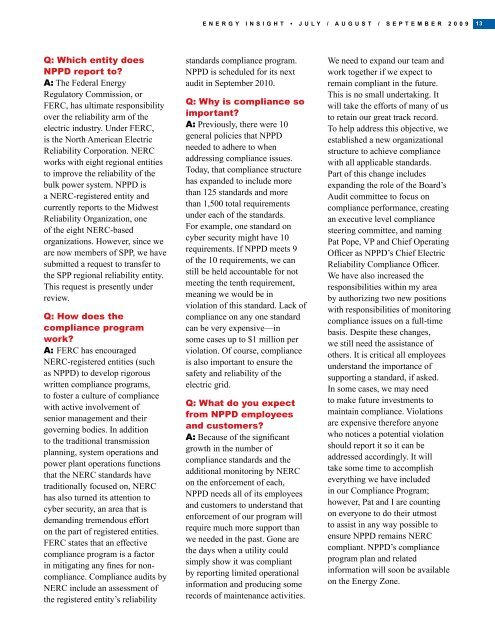July / Aug. / Sept. 2009 - Nebraska Public Power District
July / Aug. / Sept. 2009 - Nebraska Public Power District
July / Aug. / Sept. 2009 - Nebraska Public Power District
You also want an ePaper? Increase the reach of your titles
YUMPU automatically turns print PDFs into web optimized ePapers that Google loves.
Q: Which entity does<br />
NPPD report to?<br />
A: The Federal Energy<br />
Regulatory Commission, or<br />
FERC, has ultimate responsibility<br />
over the reliability arm of the<br />
electric industry. Under FERC,<br />
is the North American Electric<br />
Reliability Corporation. NERC<br />
works with eight regional entities<br />
to improve the reliability of the<br />
bulk power system. NPPD is<br />
a NERC‑registered entity and<br />
currently reports to the Midwest<br />
Reliability Organization, one<br />
of the eight NERC‑based<br />
organizations. However, since we<br />
are now members of SPP, we have<br />
submitted a request to transfer to<br />
the SPP regional reliability entity.<br />
This request is presently under<br />
review.<br />
Q: How does the<br />
compliance program<br />
work?<br />
A: FERC has encouraged<br />
NERC‑registered entities (such<br />
as NPPD) to develop rigorous<br />
written compliance programs,<br />
to foster a culture of compliance<br />
with active involvement of<br />
senior management and their<br />
governing bodies. In addition<br />
to the traditional transmission<br />
planning, system operations and<br />
power plant operations functions<br />
that the NERC standards have<br />
traditionally focused on, NERC<br />
has also turned its attention to<br />
cyber security, an area that is<br />
demanding tremendous effort<br />
on the part of registered entities.<br />
FERC states that an effective<br />
compliance program is a factor<br />
in mitigating any fines for noncompliance.<br />
Compliance audits by<br />
NERC include an assessment of<br />
the registered entity’s reliability<br />
ENERGY INSIGHT • JULY / AUGUST / SEPTEMBER <strong>2009</strong> 13<br />
standards compliance program.<br />
NPPD is scheduled for its next<br />
audit in <strong>Sept</strong>ember 2010.<br />
Q: Why is compliance so<br />
important?<br />
A: Previously, there were 10<br />
general policies that NPPD<br />
needed to adhere to when<br />
addressing compliance issues.<br />
Today, that compliance structure<br />
has expanded to include more<br />
than 125 standards and more<br />
than 1,500 total requirements<br />
under each of the standards.<br />
For example, one standard on<br />
cyber security might have 10<br />
requirements. If NPPD meets 9<br />
of the 10 requirements, we can<br />
still be held accountable for not<br />
meeting the tenth requirement,<br />
meaning we would be in<br />
violation of this standard. Lack of<br />
compliance on any one standard<br />
can be very expensive—in<br />
some cases up to $1 million per<br />
violation. Of course, compliance<br />
is also important to ensure the<br />
safety and reliability of the<br />
electric grid.<br />
Q: What do you expect<br />
from NPPD employees<br />
and customers?<br />
A: Because of the significant<br />
growth in the number of<br />
compliance standards and the<br />
additional monitoring by NERC<br />
on the enforcement of each,<br />
NPPD needs all of its employees<br />
and customers to understand that<br />
enforcement of our program will<br />
require much more support than<br />
we needed in the past. Gone are<br />
the days when a utility could<br />
simply show it was compliant<br />
by reporting limited operational<br />
information and producing some<br />
records of maintenance activities.<br />
We need to expand our team and<br />
work together if we expect to<br />
remain compliant in the future.<br />
This is no small undertaking. It<br />
will take the efforts of many of us<br />
to retain our great track record.<br />
To help address this objective, we<br />
established a new organizational<br />
structure to achieve compliance<br />
with all applicable standards.<br />
Part of this change includes<br />
expanding the role of the Board’s<br />
Audit committee to focus on<br />
compliance performance, creating<br />
an executive level compliance<br />
steering committee, and naming<br />
Pat Pope, VP and Chief Operating<br />
Officer as NPPD’s Chief Electric<br />
Reliability Compliance Officer.<br />
We have also increased the<br />
responsibilities within my area<br />
by authorizing two new positions<br />
with responsibilities of monitoring<br />
compliance issues on a full‑time<br />
basis. Despite these changes,<br />
we still need the assistance of<br />
others. It is critical all employees<br />
understand the importance of<br />
supporting a standard, if asked.<br />
In some cases, we may need<br />
to make future investments to<br />
maintain compliance. Violations<br />
are expensive therefore anyone<br />
who notices a potential violation<br />
should report it so it can be<br />
addressed accordingly. It will<br />
take some time to accomplish<br />
everything we have included<br />
in our Compliance Program;<br />
however, Pat and I are counting<br />
on everyone to do their utmost<br />
to assist in any way possible to<br />
ensure NPPD remains NERC<br />
compliant. NPPD’s compliance<br />
program plan and related<br />
information will soon be available<br />
on the Energy Zone.









